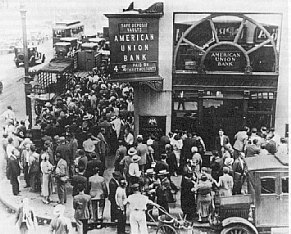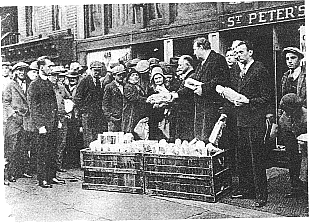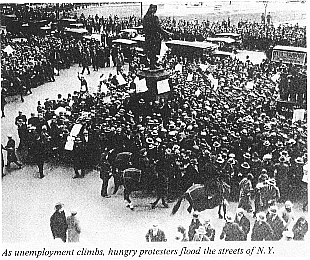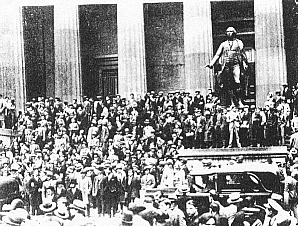The Great Depression
The Great Depression was a worldwide business slump on the
1930’s. It ranked as the worst and longest period of high
unemployment and low business activity in modern times. The Great
Depression began in October 1929, when stock values in the United
States dropped rapidly. Thousands of stockholders lost large sums
of money. Many of these stockholders were even wiped out. Banks,
factories, and stores closed and left millions of Americans
jobless and penniless. Many people had to depend on the
government or charity to provide them with food.
 During the 1920’s, many bank
failures, together with low incomes among farmer and factory
workers, helped set the stage for the depression. From 1925 to
1929, the average prices of common stocks on the New York Stock
Exchange doubled. Rising stock values encouraged many people to
buy stocks in hope of making large profits following future price
increases. Stock values dropped rapidly on October 25, 1929, now
known as Black Thursday. Almost all economists agree that the
stock market crash of 1929 started the depression. Most stock
prices remained steady on Friday and Saturday. But the next
Monday, stock prices fell again. Then, on Tuesday, October 29,
stockholders panicked and sold a record of 16,410,030 shares of
stock. Thousands of people lost huge sums of money as stock
values fell far below the prices paid for the stock. Banks and
businesses had also bought stock, and many lost so much that they
had to close. Stock values fell almost steadily for the next
three years.
During the 1920’s, many bank
failures, together with low incomes among farmer and factory
workers, helped set the stage for the depression. From 1925 to
1929, the average prices of common stocks on the New York Stock
Exchange doubled. Rising stock values encouraged many people to
buy stocks in hope of making large profits following future price
increases. Stock values dropped rapidly on October 25, 1929, now
known as Black Thursday. Almost all economists agree that the
stock market crash of 1929 started the depression. Most stock
prices remained steady on Friday and Saturday. But the next
Monday, stock prices fell again. Then, on Tuesday, October 29,
stockholders panicked and sold a record of 16,410,030 shares of
stock. Thousands of people lost huge sums of money as stock
values fell far below the prices paid for the stock. Banks and
businesses had also bought stock, and many lost so much that they
had to close. Stock values fell almost steadily for the next
three years.
 The Great Depression differed in both
length and harshness from previous depressions in the United
States. In earlier depressions, business activity had started to
pick up after one or two years. But from October 1929, until
Franklin D. Roosevelt became President in March 1933, the economy
slumped almost every month. Business failures increased rapidly
among banks, factories, and stores, and unemployment soared.
Millions of people lost their job, savings, and home. The
economic breakdown from 1930 to 1933 was the lowest ever. Prices
of industrial stocks fell about 80 per cent. Banks and
individuals with investments in the stock market lost large sums.
Banks had also loaned money to many people who could not repay
it. The deepening depression forced large numbers of people to
withdraw their savings. Banks had great difficulty meeting the
withdrawals, which came at a time when the banks were unable to
collect on many loans. Between January 1930 and March 1933, about
9,000 banks failed. The bank failures wiped out the savings of
millions of people.
The Great Depression differed in both
length and harshness from previous depressions in the United
States. In earlier depressions, business activity had started to
pick up after one or two years. But from October 1929, until
Franklin D. Roosevelt became President in March 1933, the economy
slumped almost every month. Business failures increased rapidly
among banks, factories, and stores, and unemployment soared.
Millions of people lost their job, savings, and home. The
economic breakdown from 1930 to 1933 was the lowest ever. Prices
of industrial stocks fell about 80 per cent. Banks and
individuals with investments in the stock market lost large sums.
Banks had also loaned money to many people who could not repay
it. The deepening depression forced large numbers of people to
withdraw their savings. Banks had great difficulty meeting the
withdrawals, which came at a time when the banks were unable to
collect on many loans. Between January 1930 and March 1933, about
9,000 banks failed. The bank failures wiped out the savings of
millions of people.  From 1925 to
1933, unemployment reached a record high of 13 million. Many
people who kept of found jobs had to take salary cuts.
From 1925 to
1933, unemployment reached a record high of 13 million. Many
people who kept of found jobs had to take salary cuts.
Human Suffering became a reality for millions of American s as
the depression continued. Many died of disease resulting from
lack of nutrition. Thousands lost their homes because they could
not pay the mortgage. In 1932, at least 25,000 families and more
than 200,000 young people wandered through the country seeking
food, clothing, shelter, and a job. Many youths traveled in
freight trains and lived near train yards in camps called hobo
jungles. The homeless and jobless travelers obtained food
from welfare agencies or religious missions in towns along the
way. Most of their meals consisted of soup, beans, or stew and
had little nourishment. The travelers begged for food or stole it
if they could not get something to eat in any other way. Many ate
scraps of food from garbage cans. Many people who lost their home
remained in the community. Some crowded into the home of
relative. Others moved to a shabby section of town and built
shacks from flattened tin cans and old crates.
The Great Depression affected almost every nation. It caused a
sharp decrease in world trade because each country tried to help
its own industries by raising tariffs on imported goods. The
depression caused some nations to change their leader and their
type of government. The poor economic conditions of these times
led to the rise of the German dictator Adolf Hitler and to the
Japanese invasion of China.
 The depression also had long lasting
effects on the United Sates people and government. For example,
the government took more responsibility than ever before for
strengthening the nation’s economy. In addition, many
Americans who lived during the depression stressed the importance
in later years of inquiring such material comforts as appliances
and a car. Also, the depression changed the attitudes of many
Americans toward business and the federal government. Before the
depression, most people regarded bankers and business executives
as the nation’s leaders. After the stock market crashed and
these leaders could not relieve the depression, Americans lost
faith in them. As a result, many Americans decided that the
government – not business – had the responsibility to
maintain the national economy.
The depression also had long lasting
effects on the United Sates people and government. For example,
the government took more responsibility than ever before for
strengthening the nation’s economy. In addition, many
Americans who lived during the depression stressed the importance
in later years of inquiring such material comforts as appliances
and a car. Also, the depression changed the attitudes of many
Americans toward business and the federal government. Before the
depression, most people regarded bankers and business executives
as the nation’s leaders. After the stock market crashed and
these leaders could not relieve the depression, Americans lost
faith in them. As a result, many Americans decided that the
government – not business – had the responsibility to
maintain the national economy.
 During the 1920’s, many bank
failures, together with low incomes among farmer and factory
workers, helped set the stage for the depression. From 1925 to
1929, the average prices of common stocks on the New York Stock
Exchange doubled. Rising stock values encouraged many people to
buy stocks in hope of making large profits following future price
increases. Stock values dropped rapidly on October 25, 1929, now
known as Black Thursday. Almost all economists agree that the
stock market crash of 1929 started the depression. Most stock
prices remained steady on Friday and Saturday. But the next
Monday, stock prices fell again. Then, on Tuesday, October 29,
stockholders panicked and sold a record of 16,410,030 shares of
stock. Thousands of people lost huge sums of money as stock
values fell far below the prices paid for the stock. Banks and
businesses had also bought stock, and many lost so much that they
had to close. Stock values fell almost steadily for the next
three years.
During the 1920’s, many bank
failures, together with low incomes among farmer and factory
workers, helped set the stage for the depression. From 1925 to
1929, the average prices of common stocks on the New York Stock
Exchange doubled. Rising stock values encouraged many people to
buy stocks in hope of making large profits following future price
increases. Stock values dropped rapidly on October 25, 1929, now
known as Black Thursday. Almost all economists agree that the
stock market crash of 1929 started the depression. Most stock
prices remained steady on Friday and Saturday. But the next
Monday, stock prices fell again. Then, on Tuesday, October 29,
stockholders panicked and sold a record of 16,410,030 shares of
stock. Thousands of people lost huge sums of money as stock
values fell far below the prices paid for the stock. Banks and
businesses had also bought stock, and many lost so much that they
had to close. Stock values fell almost steadily for the next
three years.  The Great Depression differed in both
length and harshness from previous depressions in the United
States. In earlier depressions, business activity had started to
pick up after one or two years. But from October 1929, until
Franklin D. Roosevelt became President in March 1933, the economy
slumped almost every month. Business failures increased rapidly
among banks, factories, and stores, and unemployment soared.
Millions of people lost their job, savings, and home. The
economic breakdown from 1930 to 1933 was the lowest ever. Prices
of industrial stocks fell about 80 per cent. Banks and
individuals with investments in the stock market lost large sums.
Banks had also loaned money to many people who could not repay
it. The deepening depression forced large numbers of people to
withdraw their savings. Banks had great difficulty meeting the
withdrawals, which came at a time when the banks were unable to
collect on many loans. Between January 1930 and March 1933, about
9,000 banks failed. The bank failures wiped out the savings of
millions of people.
The Great Depression differed in both
length and harshness from previous depressions in the United
States. In earlier depressions, business activity had started to
pick up after one or two years. But from October 1929, until
Franklin D. Roosevelt became President in March 1933, the economy
slumped almost every month. Business failures increased rapidly
among banks, factories, and stores, and unemployment soared.
Millions of people lost their job, savings, and home. The
economic breakdown from 1930 to 1933 was the lowest ever. Prices
of industrial stocks fell about 80 per cent. Banks and
individuals with investments in the stock market lost large sums.
Banks had also loaned money to many people who could not repay
it. The deepening depression forced large numbers of people to
withdraw their savings. Banks had great difficulty meeting the
withdrawals, which came at a time when the banks were unable to
collect on many loans. Between January 1930 and March 1933, about
9,000 banks failed. The bank failures wiped out the savings of
millions of people.  From 1925 to
1933, unemployment reached a record high of 13 million. Many
people who kept of found jobs had to take salary cuts.
From 1925 to
1933, unemployment reached a record high of 13 million. Many
people who kept of found jobs had to take salary cuts.  The depression also had long lasting
effects on the United Sates people and government. For example,
the government took more responsibility than ever before for
strengthening the nation’s economy. In addition, many
Americans who lived during the depression stressed the importance
in later years of inquiring such material comforts as appliances
and a car. Also, the depression changed the attitudes of many
Americans toward business and the federal government. Before the
depression, most people regarded bankers and business executives
as the nation’s leaders. After the stock market crashed and
these leaders could not relieve the depression, Americans lost
faith in them. As a result, many Americans decided that the
government – not business – had the responsibility to
maintain the national economy.
The depression also had long lasting
effects on the United Sates people and government. For example,
the government took more responsibility than ever before for
strengthening the nation’s economy. In addition, many
Americans who lived during the depression stressed the importance
in later years of inquiring such material comforts as appliances
and a car. Also, the depression changed the attitudes of many
Americans toward business and the federal government. Before the
depression, most people regarded bankers and business executives
as the nation’s leaders. After the stock market crashed and
these leaders could not relieve the depression, Americans lost
faith in them. As a result, many Americans decided that the
government – not business – had the responsibility to
maintain the national economy.